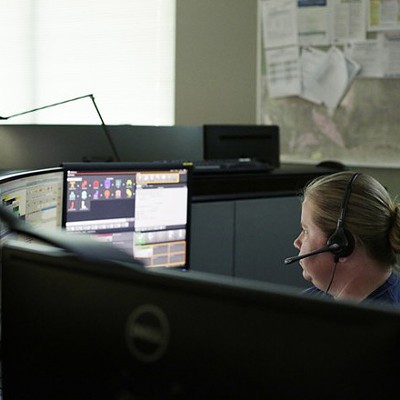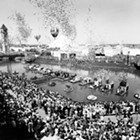Stars and stripes
[
{
"name": "Broadstreet - Instory",
"component": "25846487",
"insertPoint": "4",
"requiredCountToDisplay": "4"
},{
"name": "Broadstreet - Empower Local",
"component": "27852456",
"insertPoint": "8",
"requiredCountToDisplay": "8"
},{
"name": "Broadstreet - Instory",
"component": "25846487",
"insertPoint": "12",
"requiredCountToDisplay": "12"
},{
"name": "Broadstreet - Instory - 728x90 / 970x250",
"component": "27852677",
"insertPoint": "18",
"requiredCountToDisplay": "18"
},{
"name": "Broadstreet - Instory",
"component": "25846487",
"insertPoint": "5th",
"startingPoint": "23",
"requiredCountToDisplay": "24",
"maxInsertions": 100
}
]
& lt;B & by Sheri Boggs & & & &
From the opening dance number "In the Mood," with its energetic swing dancing and circa-1942 set, it's clear that the world premier of Our Shining Hour has high hopes. The World War II musical, directed by Timothy Childs (who wrote the script with Thomas H. Cook), ambitiously sets out to win over modern day audiences with a Victory Garden stew of nostalgia and patriotism served with a hearty slice of period song and dance.
The story of an Alabama war bride who moves with her husband to the Big Bad Apple, only to send him off to war and try to make her way in the big city, Our Shining Hour moves back and forth in time. Jill Reynolds (Deborah Cresswell), an aging war correspondent who remembers the home front side of the war all too well, tells her big-haired, teenage granddaughter (Nicole Greenwood, who plays the younger Jill as well), what it was like "back then." Set to tunes from the 1940s, including "Saturday Night is the Loneliest Night of the Week," "Over the Rainbow" and "Goodbye Mama, I'm Off to Yokohama," Our Shining Hour ambitiously endeavors to recreate a time and place in American history.
Before Saturday night's performance, Childs introduced the play as a work in progress that he hopes to eventually bring to Broadway. As such, he invited the audience to respond via mail or e-mail with comments and suggestions regarding the Coeur d'Alene Summer Theatre debut of the show. Even without the assurances of the director concerning feedback, it's not easy to review such a hopeful production when one sees problems, even if the criticism is offered in a spirit of helpfulness.
To begin with, a musical celebrating World War II is a dubious proposition indeed. This is made especially clear when we are first introduced to Jill and her granddaughter, who patronizes grandma with a line about how, with Saving Private Ryan and The Greatest Generation, people are more interested in World War II now than ever. True or not, the reference is obvious, as if spelling out to the audience, "Oh, this is why we care," and also makes us wonder if the story might just be trying to follow that same trend.
My friend quipped that the remarkable thing about the show was that it seems about as long as World War II. Not quite four and a half years, but at nearly three hours, the last act was beginning to feel like a tour of duty. Some of the saying goodbye business from the first act could have been edited out without losing a sense of the very real heartache that girlfriends, wives, friends and families felt at saying goodbye to their enlisted loved ones.
As the younger Jill, Greenwood inhabits the role with abundant sweetness but is limited by a character that is more your standard stock ingenue than a living, breathing person. While the audience knows it's supposed to care about Jill and her dream of becoming a writer, the repeated spelling out of her wishes undermines any power such a wish might have, especially against a backdrop of war. The character isn't dimensional enough to carry the irony of the-war-might-have-been-bad-but-it-made-me-a-writer plot. Instead it's just rather contrived. One wishes for Jill to strive to be something a little less cliched, say, one hell of an Army nurse, or perhaps the best damn riveter the factory had ever seen.
There were technical difficulties as well. I really looked forward to hearing the song "So Dumb, But So Beautiful" only to discover that I'd heard it in the first act but I couldn't tell, because that was the number where the orchestra drowned out the cast for most of the song. Unfortunately, this happened on more than one occasion, even with strong singers like Jennifer Avery, who plays the street-smart Rhonda and Alex Craig, who plays Jill's husband, Joe.
Still, the play had plenty of strong moments. Avery sparkled as the USO singer who less-than-willingly looks after Jill. Her Rhonda has all the big-shouldered self-assurance any 1940s heroine could hope for. Craig is good, too, as Joe, a young Southern boy who is traditional in every sense of the word -- from his willingness to fight for his country, to his generation's unwillingness to let his wife pursue a career outside the home.
Also effective were historical and cultural references worked into the dialogue, such as when Jill quotes from an article on war brides from Collier's magazine that they were all "wandering members of a disorganized club." There's also a funny scene when Craig narrates the letter Jill reads and mouths the words in the places where the letter has been censored and the words blacked out.
Ultimately, Our Shining Hour is much like the seam the girls talk about drawing up the backs of their legs to look like the coveted nylons of the time. You get the general idea of what it's supposed to be, but it's not the real thing. But with some stringent editing and a focus on developing the lead into a real, believable character, it's possible this musical can become something alive and viable. F
From the opening dance number "In the Mood," with its energetic swing dancing and circa-1942 set, it's clear that the world premier of Our Shining Hour has high hopes. The World War II musical, directed by Timothy Childs (who wrote the script with Thomas H. Cook), ambitiously sets out to win over modern day audiences with a Victory Garden stew of nostalgia and patriotism served with a hearty slice of period song and dance.
The story of an Alabama war bride who moves with her husband to the Big Bad Apple, only to send him off to war and try to make her way in the big city, Our Shining Hour moves back and forth in time. Jill Reynolds (Deborah Cresswell), an aging war correspondent who remembers the home front side of the war all too well, tells her big-haired, teenage granddaughter (Nicole Greenwood, who plays the younger Jill as well), what it was like "back then." Set to tunes from the 1940s, including "Saturday Night is the Loneliest Night of the Week," "Over the Rainbow" and "Goodbye Mama, I'm Off to Yokohama," Our Shining Hour ambitiously endeavors to recreate a time and place in American history.
Before Saturday night's performance, Childs introduced the play as a work in progress that he hopes to eventually bring to Broadway. As such, he invited the audience to respond via mail or e-mail with comments and suggestions regarding the Coeur d'Alene Summer Theatre debut of the show. Even without the assurances of the director concerning feedback, it's not easy to review such a hopeful production when one sees problems, even if the criticism is offered in a spirit of helpfulness.
To begin with, a musical celebrating World War II is a dubious proposition indeed. This is made especially clear when we are first introduced to Jill and her granddaughter, who patronizes grandma with a line about how, with Saving Private Ryan and The Greatest Generation, people are more interested in World War II now than ever. True or not, the reference is obvious, as if spelling out to the audience, "Oh, this is why we care," and also makes us wonder if the story might just be trying to follow that same trend.
My friend quipped that the remarkable thing about the show was that it seems about as long as World War II. Not quite four and a half years, but at nearly three hours, the last act was beginning to feel like a tour of duty. Some of the saying goodbye business from the first act could have been edited out without losing a sense of the very real heartache that girlfriends, wives, friends and families felt at saying goodbye to their enlisted loved ones.
As the younger Jill, Greenwood inhabits the role with abundant sweetness but is limited by a character that is more your standard stock ingenue than a living, breathing person. While the audience knows it's supposed to care about Jill and her dream of becoming a writer, the repeated spelling out of her wishes undermines any power such a wish might have, especially against a backdrop of war. The character isn't dimensional enough to carry the irony of the-war-might-have-been-bad-but-it-made-me-a-writer plot. Instead it's just rather contrived. One wishes for Jill to strive to be something a little less cliched, say, one hell of an Army nurse, or perhaps the best damn riveter the factory had ever seen.
There were technical difficulties as well. I really looked forward to hearing the song "So Dumb, But So Beautiful" only to discover that I'd heard it in the first act but I couldn't tell, because that was the number where the orchestra drowned out the cast for most of the song. Unfortunately, this happened on more than one occasion, even with strong singers like Jennifer Avery, who plays the street-smart Rhonda and Alex Craig, who plays Jill's husband, Joe.
Still, the play had plenty of strong moments. Avery sparkled as the USO singer who less-than-willingly looks after Jill. Her Rhonda has all the big-shouldered self-assurance any 1940s heroine could hope for. Craig is good, too, as Joe, a young Southern boy who is traditional in every sense of the word -- from his willingness to fight for his country, to his generation's unwillingness to let his wife pursue a career outside the home.
Also effective were historical and cultural references worked into the dialogue, such as when Jill quotes from an article on war brides from Collier's magazine that they were all "wandering members of a disorganized club." There's also a funny scene when Craig narrates the letter Jill reads and mouths the words in the places where the letter has been censored and the words blacked out.
Ultimately, Our Shining Hour is much like the seam the girls talk about drawing up the backs of their legs to look like the coveted nylons of the time. You get the general idea of what it's supposed to be, but it's not the real thing. But with some stringent editing and a focus on developing the lead into a real, believable character, it's possible this musical can become something alive and viable. F
















